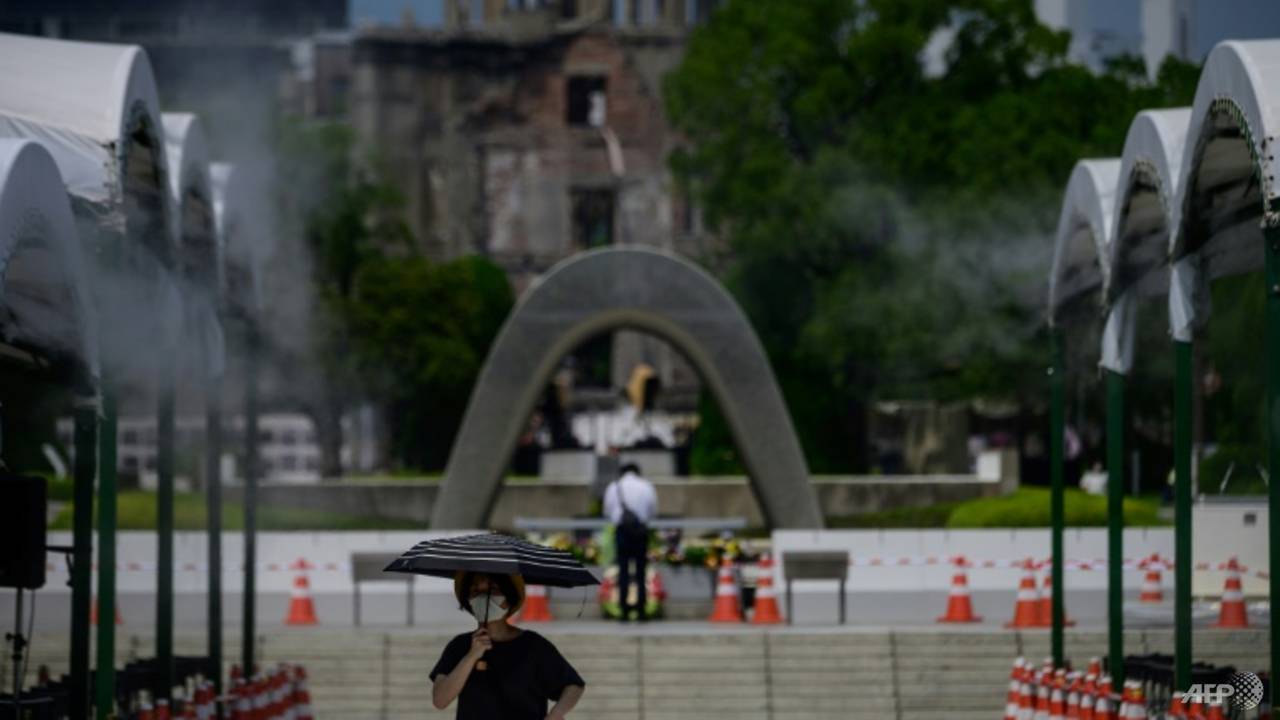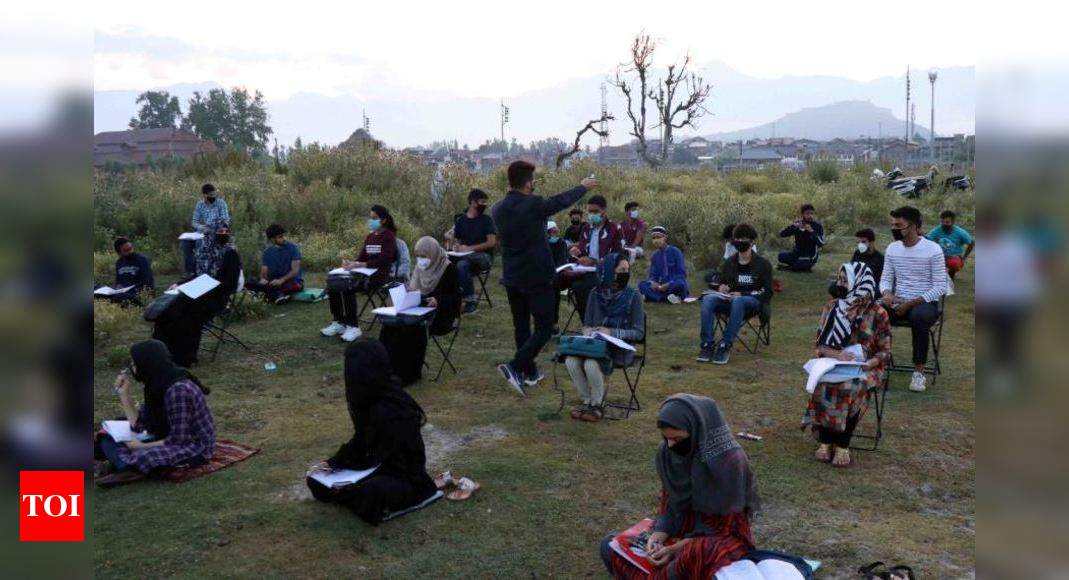TOKYO: Japan on Thursday (Aug 6) marks 75 years since the world's first atomic bomb attack, with the coronavirus pandemic forcing a scaling back of ceremonies to commemorate the victims.
Survivors, relatives and a handful of foreign dignitaries will attend this year's main event in Hiroshima to pray for the victims and call for world peace.
Advertisement
Advertisement
But the general public will be kept away, with the ceremony instead broadcast online.
Other events, including a gathering to float lanterns along the Motoyasu River, have been cancelled as coronavirus cases spike in parts of Japan.
The annual commemoration is "Hiroshima's mission of calling on people across the world to work towards peace", mayor Kazumi Matsui told reporters.
Participants will offer a silent prayer at 8:15am (2315 GMT Wednesday), the exact time the first nuclear weapon deployed in wartime hit the city.
Advertisement
Advertisement
Around 140,000 people were killed, many of them instantly, with others perishing in the weeks and months that followed, suffering radiation sickness, devastating burns and other injuries.
Three days later the United States dropped a second atomic bomb on Nagasaki, where 74,000 people were killed.
READ: 'Unspeakable horror': The attacks on Hiroshima and Nagasaki
READ: From Manhattan to Hiroshima: The race for the atom bomb
"UNSPEAKABLE HORROR"
The historical assessment of the bombings remains subject to some controversy. The United States has never apologised for the bombings, which many in the US see as having ended the war.
Japan announced its surrender just days later on Aug 15, 1945, and some historians argue the bombings ultimately saved lives by avoiding a land invasion that might have been significantly more deadly.
But in Japan, the attacks are widely regarded as war crimes because they targeted civilians indiscriminately and caused unprecedented destruction.
In 2016, Barack Obama became the first sitting US president to visit Hiroshima, where he offered no apology but embraced survivors and called for a world free of nuclear weapons.
Hiroshima and Nagasaki were key stops on Pope Francis's first trip to Japan last year, where he denounced the "unspeakable horror" of the attacks.
Graphic on the atomic bombing of Hiroshima in Japan on Aug 6, 1945. (Graphic: AFP)
At Thursday's ceremony, Hiroshima's mayor and a representative of bereaved families will deliver remarks in front of a cenotaph inscribed with the names of victims.
Volunteers will then livestream a tour of buildings affected by the bombing, and share testimonies by two atomic bomb survivors as part of efforts to mark the anniversary despite the virus.
The pandemic stalking the globe carries an all-too-familiar fear for some survivors, including 83-year-old Keiko Ogura, who lived through the Hiroshima bombing.
With the outbreak of the virus, "I recall the fear I felt right after the bombing," she told journalists last month.
"No one can escape."
READ: 75 years on, Japan bomb survivors make final pleas for abolition
READ: In milestone year, atomic bomb survivor keeps up fight for nuclear disarmament
"SOLIDARRead More – Source
TOKYO: Japan on Thursday (Aug 6) marks 75 years since the world's first atomic bomb attack, with the coronavirus pandemic forcing a scaling back of ceremonies to commemorate the victims.
Survivors, relatives and a handful of foreign dignitaries will attend this year's main event in Hiroshima to pray for the victims and call for world peace.
Advertisement
Advertisement
But the general public will be kept away, with the ceremony instead broadcast online.
Other events, including a gathering to float lanterns along the Motoyasu River, have been cancelled as coronavirus cases spike in parts of Japan.
The annual commemoration is "Hiroshima's mission of calling on people across the world to work towards peace", mayor Kazumi Matsui told reporters.
Participants will offer a silent prayer at 8:15am (2315 GMT Wednesday), the exact time the first nuclear weapon deployed in wartime hit the city.
Advertisement
Advertisement
Around 140,000 people were killed, many of them instantly, with others perishing in the weeks and months that followed, suffering radiation sickness, devastating burns and other injuries.
Three days later the United States dropped a second atomic bomb on Nagasaki, where 74,000 people were killed.
READ: 'Unspeakable horror': The attacks on Hiroshima and Nagasaki
READ: From Manhattan to Hiroshima: The race for the atom bomb
"UNSPEAKABLE HORROR"
The historical assessment of the bombings remains subject to some controversy. The United States has never apologised for the bombings, which many in the US see as having ended the war.
Japan announced its surrender just days later on Aug 15, 1945, and some historians argue the bombings ultimately saved lives by avoiding a land invasion that might have been significantly more deadly.
But in Japan, the attacks are widely regarded as war crimes because they targeted civilians indiscriminately and caused unprecedented destruction.
In 2016, Barack Obama became the first sitting US president to visit Hiroshima, where he offered no apology but embraced survivors and called for a world free of nuclear weapons.
Hiroshima and Nagasaki were key stops on Pope Francis's first trip to Japan last year, where he denounced the "unspeakable horror" of the attacks.
Graphic on the atomic bombing of Hiroshima in Japan on Aug 6, 1945. (Graphic: AFP)
At Thursday's ceremony, Hiroshima's mayor and a representative of bereaved families will deliver remarks in front of a cenotaph inscribed with the names of victims.
Volunteers will then livestream a tour of buildings affected by the bombing, and share testimonies by two atomic bomb survivors as part of efforts to mark the anniversary despite the virus.
The pandemic stalking the globe carries an all-too-familiar fear for some survivors, including 83-year-old Keiko Ogura, who lived through the Hiroshima bombing.
With the outbreak of the virus, "I recall the fear I felt right after the bombing," she told journalists last month.
"No one can escape."
READ: 75 years on, Japan bomb survivors make final pleas for abolition
READ: In milestone year, atomic bomb survivor keeps up fight for nuclear disarmament
"SOLIDARRead More – Source











